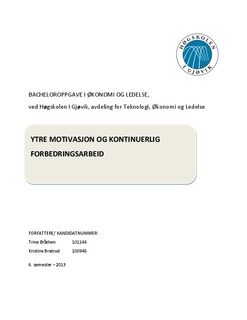| dc.contributor.author | Bråthen, Trine | |
| dc.contributor.author | Bratrud, Kristine | |
| dc.date.accessioned | 2013-07-05T10:40:55Z | |
| dc.date.available | 2013-07-05T10:40:55Z | |
| dc.date.issued | 2013 | |
| dc.identifier.uri | http://hdl.handle.net/11250/143588 | |
| dc.description.abstract | NORSK: Formålet med denne bacheloroppgaven er å belyse om ytre motivasjon påvirker de ansattes forhold til å delta i det kontinuerlige forbedringsarbeidet. Dette har blitt diskutert ved bruk av data fra Ringnes Bryggeri, Gjelleråsen. Innsamlingen av data er gjort ved bruk av kvalitativ metode gjennom ustrukturerte intervjuer og observasjoner.
Ytre motivasjon belyses ved å se på belønninger, beslutningsmyndighet, og aksept for prøving og feiling. Alle disse faktorene knyttes til de ansattes forhold til å delta i det kontinuerlige forbedringsarbeidet. I diskusjonskapittelet kommer det frem at det kontinuerlige forbedringsarbeidet vil fungere mest effektivt dersom det blir en naturlig del av arbeidshverdagen. Hvis ansatte kun motiveres til å delta i det kontinuerlige forbedringsarbeidet på bakgrunn av at de blir ytre motivert, kan man være avhengig av en opprettholdelse av dette for at de ansatte skal fortsette å delta. Målet bør derfor etter hvert være å stimulere den indre motivasjonen til de ansatte slik at arbeidet med kontinuerlige forbedringer blir en integrert del av arbeidshverdagen.
Konklusjonen i hovedproblemstillingen viser at ytre motivasjon kan være en viktig del av det kontinuerlige forbedringsarbeidet. Alle de tre faktorene som belyser ytre motivasjon viser seg å være viktig for de ansattes forhold til å delta i det kontinuerlige forbedringsarbeidet. | no_NO |
| dc.description.abstract | ENGLISH: The purpose of this bachelor thesis is to shed light on extrinsic motivation and how it affects employees’ relationship to participate in the work with continuous improvements. This has been discussed through using data from Ringnes Bryggeri, Gjelleråsen. The collection of data is done using qualitative methods through unstructured interviews and observations.
Extrinsic motivation is illustrated by looking at rewards, decision making, and acceptance of trial and error. All these factors are related to the employees’ relationship to participate in the work with continuous improvements. In the discussion section it emerges that the continuous improvement efforts will be most effective if it becomes a natural part of everyday work. If employees are only motivated to participate in the continuous improvement efforts on the basis that they are externally motivated, one is dependent on the maintenance of the external motivational factors for the employees to remain motivated. The goal should eventually be stimulating the intrinsic motivation of the staff, to ensure that the work with continuous improvement feels like an integrated part of everyday work.
The conclusion of the main question shows that extrinsic motivation can be an important part of the continuous improvement process. All three factors which highlighted extrinsic motivation proved to be important for the employees’ relationship to participate in the work with continuous improvement, both in terms of motivation and commitment. | no_NO |
| dc.language.iso | nob | no_NO |
| dc.subject | bedrift | no_NO |
| dc.subject | personalutvikling | no_NO |
| dc.subject | arbeidsliv | no_NO |
| dc.subject | motivasjon | no_NO |
| dc.title | Ytre motivasjon og kontinuerlig forbedringsarbeid | no_NO |
| dc.title.alternative | Extrinsic motivation and continuous improvement | no_NO |
| dc.type | Bachelor thesis | no_NO |
| dc.subject.nsi | VDP::Social science: 200::Economics: 210::Business: 213 | no_NO |
| dc.source.pagenumber | 93 | no_NO |
